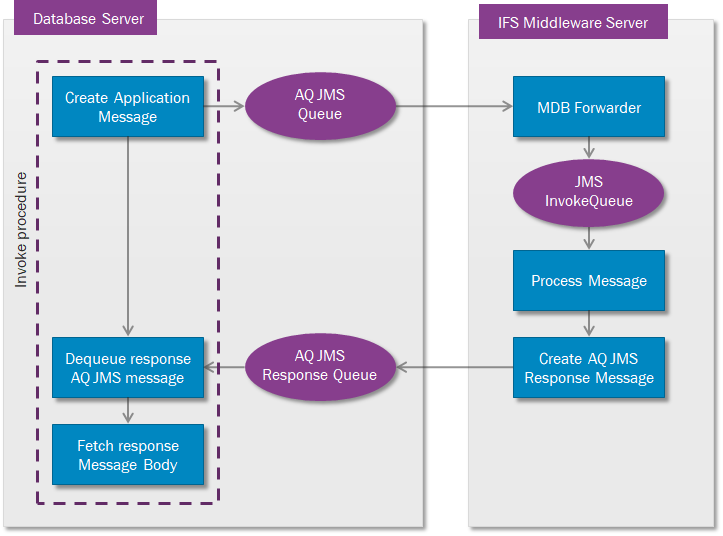
The PLSQL Access Provider allows invocations of server operations from PL/SQL business logic code executing within the Oracle database.
The PLSQL Access Provider is used to
send messages, call outbound BizAPIs, and to invoke any operation implemented
within IFS Middleware Server. PLSQL Access Provider is implemented
in the PL/SQL package PLSQL_Server_API.
There are a number of overloaded procedures in the PLSQL_Server_API
package that can be used for posting of messages. Names of all those procedure
start with Post, e.g. Post_Outbound_Bizapi. All those
method simply create a new
Application Message putting the incoming data as Message Body. In
most cases it is also possible to specify the
outbound BizAPI that is supposed to be executed by
Message Processor
later on, once the message is being processed.
A database trigger will fire as soon as the transaction that is calling the
actual
Post procedure will be committed and the message will be picked up
by
the
Batch Processor, which means that posting of messages is an asynchronous
operation.
Note that creation of the Application Message is done within the
same transaction as the one that has initiated the call to the actual Post method. If
the transaction will be rolled back, the message will not be processed.
Names of procedures in PLSQL_Server_API package dedicated for
invoking of messages are starting with Invoke, e.g.
Invoke_Outbound_Request_Bizapi or Invoke_Record_Impersonate.
The main difference between posting and invoking messages is that invoking of
messages is done synchronously, i.e. the procedure will wait for the response
and return it back to the caller once received.
With the Invoke procedures it is possible to specify
BizAPI to be executed by
Message Processorr, but some versions allow also usage of operations not
being defined as BizAPIs.
Initially invoking of messages has been implemented using the HTTP protocol to access SOAP Gateway. But because of growing needs for stronger security it became hard to configure Oracle database to use the HTTP protocol. Therefore the logic has be re-written and the new algorithm, based on Oracle AQ, is available as of patch 145612 (available within Update 5). See also description of a typical Message flow for an Outbound Request BizAPI.

Execution steps:
Invoke procedure creates an
Application Message with incoming data in the Message Body and saves
it. This is done in a separate (autonomous) transaction. The message is tagged so it can
be distinguished from other messages by
Message Processor.Invoke method is then waiting for the Response AQ JMS Message.Invoke procedure retrieves the Response AQ JMS
Message and fetches the Reply Message Body from the database.
By default the Invoke method will wait up to 20 min for response,
but the timeout can be
configured in Solution Manager, Setup IFS Connect feature. But if the
Middleware Server is not up and running, the request will timeout after 1
min.
Note that AQ messages not consumed with the timeout period will be moved to AQ Exception Queue. There is a predefined cleaning job that removes such messages.
Note that in the old implementation Application Messages were saved only in some circumstances, while the new implementation will always save a new Application Message for each invocation.
Important! Synchronous invocations will execute in their own transactions, separate
from any
open transaction within Oracle. An Oracle rollback after a synchronous
invocation using PLSQL Access Provider will not roll back the effects of
the invocation. However asynchronous postings done with for example Post_Event_Message
will be part of the Oracle transaction and included in rollbacks.